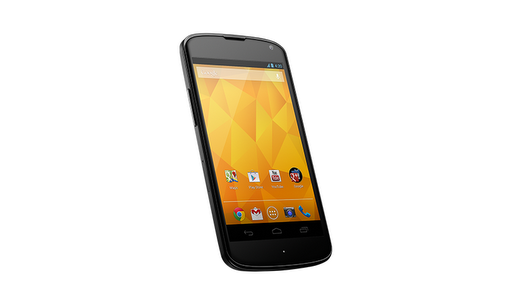The Nexus program has always offered consumers a new Googlefied phone to choose from, and the Nexus 4 is the new hotness. As far as handsets go, it’s impressive: it’s got quad-core innards, a vibrant display, and a brand new shiny version of Android.
But while the Nexus 4 is a solid handset, it’s possible those quad-core innards are a little too powerful for its own good. The hard throttling under sustained load could lead to the phone chopping performance mode right when you need it most, and Google might be promising speeds it can’t consistently deliver. There’s also the glaring omission of LTE. The compromise is that for choosing this phone, you get consistent software updates and access to the new and enhanced features that Google bundled with Android 4.2. They’re quite nice, and if that trade is worth it to you, then the Nexus 4 is the handset to get.
Good
- Great screen is beautiful to look at, easy to read
- Comes with Android 4.2 and the guaranteed promise of immediate software updates
- Long-life battery life
- Camera is a leg up over its sister phone, the Optimus G
- HSPA+ will ensure the phone works in other 3G markets
- Contract-free pricing is less expensive than the Optimus G
Bad
- Nexus design is a bit unimaginative
- Lacks the more advanced power management of the Optimus G
- Speaker is muffled if the phone is laid down on its back side
- No LTE
Ugly
- No SD card slot makes this phone an automatic no-buy for many
The idea that a Nexus quad-core smartphone is hitting the market with a starting price one dollar shy of $300 is simply stunning. Even more so is that it’s available without any contract or carrier locks, which means you can use it virtually anywhere in the world. Adding yet another layer of amazement is the fact that this particular device will always be among the first (if not the first) to get the latest version of Android for the foreseeable future. What once was a smartphone series designed for developers has been decked out with top-notch features and priced so attractively that consumers will take notice of it; there’s nothing comparable that comes close to it in that price range. This is a smartphone that we’d normally expect to be much more expensive unlocked, but Google set a precedent by lowering the cost of the Galaxy Nexus, keeping the Nexus 7 at $200 and is now continuing the trend with the Nexus 4. The price of freedom has never been more reasonable.
Sure, the Nexus 4 is not without its hiccups, but none of its predecessors have been perfect, either. And given the boost in real-world performance, the better camera and various other new features, it’s even more tempting than all those previous devices whose shoes it’s trying to fill. In a case like this… you have our permission not to resist.
PROS
- Beautiful and vibrant 720p display
- Very affordable price
- Pentaband HSPA+
- Android 4.2 delivers new features
CONS
- Poor battery life
- Doesn’t support LTE
BOTTOMLINE
It may not be the best phone on the planet, but its high-end specs, elegant build and incredibly affordable price make it worth throwing your money at.
The Nexus 4 is absolutely wonderful, but it’s also vexing. Frustrating. Annoying. It’s easily the best Android phone on the market right now, and has some of the most powerful software that’s ever been put on a mobile phone. It’s an upgrade from last year’s Galaxy Nexus in every way. It’s terrific — save for one small thing.
In the US, a flagship phone without LTE is like a muscle car with no wheels. For other networks in other countries, and for the lucky T-Mobile customers out there that are getting great speeds on its HSPA+ network — great. No problem. Go get this phone. But for others — many others — it’s hard to imagine buying this device when you know it’s a generation behind in terms of network technology.
A little over a year ago, I bristled at the fact that the iPhone 4S didn’t have LTE, but I also admitted that the phone was a still a “force to be reckoned with.” The same can be said for the Nexus 4, with a caveat. The mobile industry has changed a lot in the last 12 months. LTE is the norm, not a nice-to-have, and its performance has shown the cracks in the aging GSM networks of the US. No flagship device is released without it. Not even the iPhone.
For a phone and an OS built for the cloud, I think it’s unacceptable to not offer a version that takes advantage of our fastest mobile networks.
If you buy the Nexus 4, you have to decide whether you’re willing to compromise data speeds for the purest and best form of the Android OS. After comparing the options and seeing the gulf between Google’s flagship and other devices on the market, I’ve decided it’s a compromise I won’t be making again.
GOOD STUFF
- Improved build quality
- Android 4.2 is fantastic
- Excellent price for a device of this caliber
BAD STUFF
- Lacks LTE
- Screen a bit washed out
- Glass backing breaks easily
Overall, the Nexus 4 is a good phone, with especially good prices for unlocked versions. But I’d advise Android buyers to consider other models with LTE, better speakers, and the ability to add more memory and work on all carriers.
CNET:
In general, the device is excellent and reliable — its internal speeds are zippy and smooth, the camera is packed with new features, and Android 4.2 is indeed sleek. The Nexus 4 is one of the best LG phones out there alongside the Optimus G, and for such a recognizable phone, it’s extremely affordable. In addition, if you’re already a T-Mobile user, the Nexus 4 is the carrier’s best offering next to the Galaxy S3.
But aside from natively sporting Android Jelly Bean, the Nexus 4 doesn’t offer up anything significantly new. If you ask yourself, what does this phone do to expand and progress the Nexus brand? The answer is, nothing much.
Though it’s fast, the Optimus G also has a quad-core CPU and the AT&T model is 4G LTE-capable to boot. Compared with the Samsung Galaxy S3’s design, the Nexus 4 looks all too common. And if you’re concerned about what Google said about LTE and battery life, look no further than the Motorola Droid Razr Maxx HD. Plainly put, while the Nexus 4’s HSPA+ speeds are respectable, its lack of LTE capabilities will definitely leave users feeling behind or slighted.
This is significant. Nexus handsets have never sold terribly well. They’ve always been niche products for hackers, developers and Android enthusiasts. But the Nexus 4 is different. It’s one of three devices — along with the Nexus 7 and Nexus 10 tablets — that Google is positioning not only as true alternatives to the best products from rivals Amazon, Apple and Microsoft, but also to the products of its partners in the Android world. Nexus has grown from a hacker platform to a capital-B Brand. It’s a place for thinking big, and for showing off cool new stuff like NFC, wireless charging and higher-density displays. There’s even a TV and print campaign to trumpet the launch of these next-gen devices. This handset is the flagship of the Nexus line, and the best example of Google’s ambitious side-project growing up.
WIRED Thoughtfully designed hardware displays a quality of finish that can compete with the best rival smartphones. Big 4.7-inch screen is crisp, detailed and beautiful. Quad-core processor and 2GB of RAM gives it power to spare. NFC and wireless charging show Google pushing new platforms forward. Bargain pricing for and unlocked beast of a phone. Latest Android, directly from Google, with no delays from carriers or hardware makers.
TIRED No LTE connectivity means the Nexus 4 is confined to slower, older mobile networks. No micro SD card slot or expandable storage of any sort. The rear speaker isn’t very loud and doesn’t sound very good.




